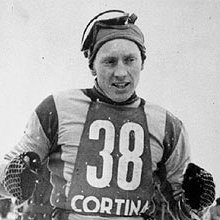Eugenio_Monti
Eugenio Monti
Italian bobsledder
Eugenio Monti (23 January 1928 – 1 December 2003) was an Italian bobsledder and alpine skier.[1] He is one of the most successful athletes in the history of the bobsleigh, with ten World championship medals (of which nine gold) and 6 Olympic medals including two golds. He is known also for his acts of sportsmanship during the 1964 Winter Olympics in Innsbruck, Austria, which made him the first athlete ever to receive the Pierre de Coubertin medal.[2][3]
 Monti in the 1950s | |||||||||||||||||||||||||||||||||||||||||||||||||||||||||||||||||||||||||||||||
| Personal information | |||||||||||||||||||||||||||||||||||||||||||||||||||||||||||||||||||||||||||||||
|---|---|---|---|---|---|---|---|---|---|---|---|---|---|---|---|---|---|---|---|---|---|---|---|---|---|---|---|---|---|---|---|---|---|---|---|---|---|---|---|---|---|---|---|---|---|---|---|---|---|---|---|---|---|---|---|---|---|---|---|---|---|---|---|---|---|---|---|---|---|---|---|---|---|---|---|---|---|---|---|
| Born | (1928-01-23)23 January 1928 Toblach, Italy | ||||||||||||||||||||||||||||||||||||||||||||||||||||||||||||||||||||||||||||||
| Died | 1 December 2003(2003-12-01) (aged 75) Belluno, Italy | ||||||||||||||||||||||||||||||||||||||||||||||||||||||||||||||||||||||||||||||
| Sport | |||||||||||||||||||||||||||||||||||||||||||||||||||||||||||||||||||||||||||||||
| Country | |||||||||||||||||||||||||||||||||||||||||||||||||||||||||||||||||||||||||||||||
| Sport | Bobsleigh | ||||||||||||||||||||||||||||||||||||||||||||||||||||||||||||||||||||||||||||||
Medal record
| |||||||||||||||||||||||||||||||||||||||||||||||||||||||||||||||||||||||||||||||
Born in Toblach, Italy, The Flying Redhead was the best Italian young skier: he won the national titles in slalom and giant slalom, and finished third in downhill, but a 1951 accident stopped his alpine skiing career when he tore ligaments in both of his knees. Monti switched to bobsleigh, finding great success as a result. In 1954 he won his first Italian championship and in 1957 won his first world championship.[1][4]
At the 1956 Winter Olympics in Cortina d'Ampezzo, he won silver medals in the 2-man and 4-man bobsled events. He could not compete in the 1960 Winter Olympics in Squaw Valley, California, because the bobsled race was not held for economic reasons (for the only time in the history of the Winter Olympic Games).[1]
But it was during the 1964 Winter Olympics in Innsbruck that Monti performed the best-known act of his sporting career. Realizing that British bobsledders Tony Nash and Robin Dixon had broken a bolt on their sled, Monti lent them the bolt off his sled. The Britons won the gold medal in the 2-man bobsled, while Monti and his teammate took the bronze medal. Answering critics from the home press, Monti told them "Nash didn't win because I gave him the bolt. He won because he had the fastest run." Monti also showed his act of selfless generosity in the four-man competition. There, the Canadian team of Vic Emery had damaged their sled's axle and would have been disqualified had not Monti and his mechanics come to the rescue. The sled was repaired and the Canadian team went on to win the gold medal, while Monti's team took bronze. For these acts of sportsmanship, he was awarded the Pierre de Coubertin medal.[1][5]
Finally, at the 1968 Winter Olympics in Grenoble, France, a 40-year-old Monti won a gold in both the two-man and four-man events (the first non-German to do so). After his victory, he received Italy's highest civilian honor – the Commendatore of the Italian Republic and then retired to labor in his skiing facilities in Cortina.[1]
Struck by numerous hardships (separation from his wife, the departure of his daughter for the United States, the death of his son from an overdose), suffering from Parkinson's disease, on 30 November 2003 he shot himself in the head; transported to the hospital in Belluno, he died the next day.[6]
Turn 19 at Cesana Pariol, the site of the 2006 Winter Olympic bobsled, luge, and skeleton competitions, was named for Monti. The bobsleigh track that Monti competed on for years in Cortina and is slated for the 2026 Winter Olympics was renamed in his honor following his 2003 death.
Bobsleigh
Olympic Games
- Gold medal in the two-man at the 1968 Winter Olympics
- Gold medal in the four-man at the 1968 Winter Olympics
- Silver medal in the two-man at the 1956 Winter Olympics
- Silver medal in the four-man at the 1956 Winter Olympics
- Bronze medal in the two-man at the 1964 Winter Olympics
- Bronze medal in the four-man at the 1964 Winter Olympics
World Championships
Alpine skiing
National titles
Monti has won three national titles.[7][8]
- Italian Alpine Ski Championships
- Slalom: 1949, 1950 (2)
- Giant slalom: 1950 (1)
- "Terruzzi racconta: Eugenio Monti" (in Italian). redbull.com. Retrieved 21 February 2021.
- "Top-10 moments of Olympic sportsmanship". olympic.ca. 21 June 2013. Retrieved 21 February 2021.
- "The Legend of the "Flying Redhead"". dolomiti.org. Archived from the original on 2004-08-29. Retrieved 21 February 2021.
- "Eugenio Monti: il "Rosso volante". Interview with Eugenio Monti (2003)". torino2006.org. Archived from the original on 12 August 2007. Retrieved 21 February 2021.
- "A lesson in sportsmanship from Monti's actions in 1964". geusc.bc.ca. Archived from the original on 2004-08-06. Retrieved 21 February 2021.
- "Monti tenta il suicidio una leggenda in fin di vita". repubblica.it. 1 December 2003. Retrieved 21 February 2021.
- "Campionati italiani assoluti, l'albo d'oro della discesa" (in Italian). fisi.org. Archived from the original on 13 January 2014. Retrieved 16 February 2021.
- "L'albo d'oro della discesa femminile dei Campionati Italiani" (in Italian). fisi.org. Retrieved 16 February 2021.[dead link]
- Eugenio Monti at Olympics.com

- Eugenio Monti at Olympedia

- Eugenio Monti at the Comitato Olimpico Nazionale Italiano (in Italian)
| Summer Olympics | ||
|---|---|---|
| Preceded by | 1964 Innsbruck |
Succeeded by |